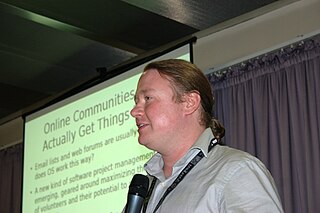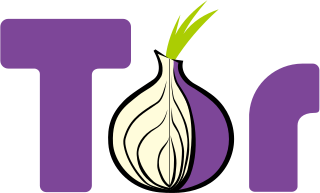See also
- HTTPS Everywhere – also made by the EFF
- Privacy Badger – also made by the EFF
| Developer(s) | Electronic Frontier Foundation |
|---|---|
| Preview release | 0.1.0 / 2009-05-05 |
| Repository | Switzerland on SourceForge |
| Operating system | Windows, macOS, Linux |
| License | GNU General Public License |
| Website | eff |
Switzerland (named after the European country of the same name) is an open-source network monitoring utility developed and released by the Electronic Frontier Foundation (EFF). [1] Its goal is to monitor network traffic between two systems running the program to see if the user's Internet service provider is violating network neutrality, like Comcast did in 2007 with the BitTorrent protocol. [2]
Switzerland was featured in the Technology section of an issue of New Scientist in August 2008. [3]
Prime95, also distributed as the command-line utility mprime for FreeBSD and Linux, is a freeware application written by George Woltman. It is the official client of the Great Internet Mersenne Prime Search (GIMPS), a distributed computing project dedicated to searching for Mersenne primes. It is also used in overclocking to test for system stability.

Brian Behlendorf is an American technologist, executive, computer programmer and leading figure in the open-source software movement. He was a primary developer of the Apache Web server, the most popular web server software on the Internet, and a founding member of the Apache Group, which later became the Apache Software Foundation. Behlendorf served as president of the foundation for three years. He has served on the board of the Mozilla Foundation since 2003, Benetech since 2009 and the Electronic Frontier Foundation since 2013. Currently, Behlendorf serves as the General Manager of the Open Source Security Foundation.
Nagios Core, formerly known as Nagios, is a free and open-source computer-software application that monitors systems, networks and infrastructure. Nagios offers monitoring and alerting services for servers, switches, applications and services. It alerts users when things go wrong and alerts them a second time when the problem has been resolved.

Carnivore, later renamed DCS1000, was a system implemented by the Federal Bureau of Investigation (FBI) that was designed to monitor email and electronic communications. It used a customizable packet sniffer that could monitor all of a target user's Internet traffic. Carnivore was implemented in October 1997. By 2005 it had been replaced with improved commercial software.

Hepting v. AT&T is a United States class action lawsuit filed in January 2006 by the Electronic Frontier Foundation (EFF) against the telecommunications company AT&T, in which the EFF alleges that AT&T permitted and assisted the National Security Agency (NSA) in unlawfully monitoring the communications of the United States, including AT&T customers, businesses and third parties whose communications were routed through AT&T's network, as well as voice over IP telephone calls routed via the Internet.
Investigative Data Warehouse (IDW) is a searchable database operated by the FBI. It was created in 2004. Much of the nature and scope of the database is classified. The database is a centralization of multiple federal and state databases, including criminal records from various law enforcement agencies, the U.S. Department of the Treasury's Financial Crimes Enforcement Network (FinCEN), and public records databases. According to Michael Morehart's testimony before the House Committee on Financial Services in 2006, the "IDW is a centralized, web-enabled, closed system repository for intelligence and investigative data. This system, maintained by the FBI, allows appropriately trained and authorized personnel throughout the country to query for information of relevance to investigative and intelligence matters."

The Digital Collection System Network (DCSNet) is the Federal Bureau of Investigation (FBI)'s point-and-click surveillance system that can perform instant wiretaps on almost any telecommunications device in the US.

Bank Julius Baer & Co. v. WikiLeaks, 535 F. Supp. 2d 980, was a lawsuit filed by Bank Julius Baer against the website WikiLeaks.

Michael Wayne Godwin is an American attorney and author. He was the first staff counsel of the Electronic Frontier Foundation (EFF), and he created the Internet adage Godwin's law and the notion of an Internet meme, as reported in the October 1994 issue of Wired. From July 2007 to October 2010, he was general counsel for the Wikimedia Foundation. In March 2011, he was elected to the Open Source Initiative board. Godwin has served as a contributing editor of Reason magazine since 1994. In April 2019, he was elected to the Internet Society board. From 2015 to 2020, he was general counsel and director of innovation policy at the R Street Institute. In August 2020, he and the Blackstone Law Group filed a lawsuit against the Trump administration on behalf of the employees of TikTok.
The Electronic Frontier Foundation (EFF) is an international non-profit digital rights group based in San Francisco, California. The foundation was formed on 10 July 1990 by John Gilmore, John Perry Barlow and Mitch Kapor to promote Internet civil liberties.
The Electronic Frontier Foundation (EFF) is an international non-profit advocacy and legal organization based in the United States.
MiTAP, or Mitre Text and Audio Processing, is a computer system that tries to automatically gather, translate, organize, and present information "for monitoring infectious disease outbreaks and other global events." It is also used in the FBI Investigative Data Warehouse.

Jillian C. York is an American free-expression activist and author. She serves as Director of International Freedom of Expression at the Electronic Frontier Foundation (EFF), and a founding member of Deep Lab. She is the author of Silicon Values: The Future of Free Speech Under Surveillance Capitalism and Morocco - Culture Smart!: the essential guide to customs & culture.
Internet censorship in Syria is extensive. Syria bans websites for political reasons and arrests people accessing them. Filtering and blocking was found to be pervasive in the political and Internet tools areas, and selective in the social and conflict/security areas by the OpenNet Initiative in August 2009.

Xymon, a network monitoring application using free software, operates under the GNU General Public License; its central server runs on Unix and Linux hosts.

The FISA Improvements Act is a proposed act by Senator Dianne Feinstein, Chair of the Senate Intelligence Committee. Prompted by the disclosure of NSA surveillance by Edward Snowden, it would establish the surveillance program as legal, but impose some limitations on availability of the data. Opponents say the bill would codify warrantless access to many communications of American citizens for use by domestic law enforcement.
HTTPS Everywhere is a free and open-source browser extension for Google Chrome, Microsoft Edge, Mozilla Firefox, Opera, Brave, Vivaldi and Firefox for Android, which is developed collaboratively by The Tor Project and the Electronic Frontier Foundation (EFF). It automatically makes websites use a more secure HTTPS connection instead of HTTP, if they support it. The option "Encrypt All Sites Eligible" makes it possible to block and unblock all non-HTTPS browser connections with one click. Due to the widespread adoption of HTTPS on the internet, and the integration of HTTPS-only mode on major browsers, the extension will be retired at the end of 2022.

The Tor Project, Inc. is a Seattle-based 501(c)(3) research-education nonprofit organization founded by computer scientists Roger Dingledine, Nick Mathewson and five others. The Tor Project is primarily responsible for maintaining software for the Tor anonymity network.

Privacy Badger is a free and open-source browser extension for Google Chrome, Mozilla Firefox, Opera, and Firefox for Android created by the Electronic Frontier Foundation (EFF). Its purpose is to promote a balanced approach to internet privacy between consumers and content providers by blocking advertisements and tracking cookies that do not respect the Do Not Track setting in a user's web browser. A second purpose, served by free distribution, has been to encourage membership in and donation to the EFF.
The Open Wireless Movement hosted at OpenWireless.org is an Internet activism project which seeks to increase Internet access by encouraging people and organizations to configure or install software on their own wireless router to offer a separate public guest network or to make a single public wireless access point. If many people did this, then a ubiquitous global public wireless network would be created which would achieve and surpass the goal of increasing Internet access.